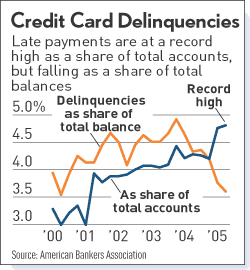Here we go – just in time for the new Bankruptcy Law to take effect.

Record Credit Card Delinquencies In Q2 As Gas Prices Squeeze Poorer Shoppers
BY LAURA MANDARO
INVESTOR’S BUSINESS DAILY
The number of delinquent credit card accounts rose to a record high in the second quarter as higher gas prices took a bigger chunk out of consumers’ wallets, said a bank trade group Wednesday.
A survey of commercial banks found 4.81% of consumer bank cards were 30 days or more past due, the highest reading since the American Bankers Association began tracking the data in 1973.
That’s an increase from the first quarter’s upwardly revised 4.76%.
Late Balances Declining
While more card holders stopped payments, the volume of bad loans actually declined.
The percent of overdue credit card balances fell to a five-year low of 3.6% vs. 3.76% in the first quarter, a trend consistent with credit quality data compiled by the Federal Reserve and others.
Fitch Ratings, for instance, said delinquency rates steadily improved last year and into the second quarter as job growth rose.
But nonemployment pressure coming from gasoline prices and bankruptcy law changes have been building since the second quarter.
It now costs about $48 to fill a midsize car with gas, or $8 more than it did in June, said the ABA. And households could spend 31% more for heating costs this winter, said a September Energy Department forecast — made before Hurricane Rita closed more oil and gas production.
Discount retailers like Wal-Mart (WMT) have blamed higher gas prices for cutting into their low-income customer base’s purchasing ability.
Gas prices have started to affect more middle-class shoppers in the last few months, according to the International Council of Shopping Centers.
The second-quarter uptick in delinquent credit card accounts, as opposed to total bad loans, suggests holders with lower borrowings are having trouble making payments.
“We’ve seen greater stress on low-end consumers from an increase in energy prices, whereas high-end consumers seem to be able to spend pretty robustly,” said Stephen Schulz, a specialty finance analyst at Keefe, Bruyette & Woods.
Sensitivity to energy prices, combined with more widespread card use by middle-income consumers, who tend to have lower balances, may be the reason for a rise in individual account delinquencies while bad loans fall, he said.
Even more than energy, an impending change to the personal bankruptcy law will likely lift credit card delinquencies later this year and early next year. Filings have spiked ahead of the Oct. 17 implementation of the federal law that will make it more difficult to declare Chapter 7, which forgives most debts.
“We expect charge-offs to trend higher due to bankruptcy filings, compounded by rising energy costs,” said Michael Dean, a managing director at Fitch.
Last week, the number of personal filings in the U.S. jumped to 55,052 — a record that beat the prior week’s high, said Lundquist Consulting.
Fitch expects filings to outpace 2004 totals by more than 6%.
Meanwhile, credit card rates have been rising.
That’s because most are tied to LIBOR or the prime rate, and these rates are up as the Fed has boosted short-term interest rates.
And in yet one more short-term challenge for consumers, credit card lenders are hiking minimum payment requirements on their cards after regulators warned some payments were too low to pay off any of the loans’ principal.
“We were finding that some banks had some minimum payments where the debt wasn’t being reduced,” said Dean DeBuck, a spokesman for the Office of the Comptroller of the Currency, a national bank regulator. “We thought it was a safety and soundness issue for the banks, and fairness for consumers.”
Regulators expect card lenders by year-end to ensure that consumers’ minimum payments cover interest, fees and at least 1% of the balance.
No. 1 credit card issuer Chase, a unit of JPMorgan Chase, expects to hike minimum payment standards in the fourth quarter.
While benefiting consumers’ credit standings in the long run, higher monthly payments could also help push up delinquencies at the onset.
“Banks are increasing their minimum payments, and that’s increasing pressure on the marginal borrower,” said David Hendler, an analyst with research firm CreditSights.
Source
